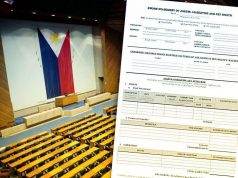Youths call for gov’t action on child abuse
By Roberto A. Vergara, Jr.
Digital Reporter, SparkUp
FILIPINO YOUTHS from different special needs groups on Thursday, Nov. 23, called on the government to take action on child abuse in the country.
In an assembly organized by the United Nations Children’s Fund (UNICEF) and Child Rights Network in celebration of “World Children’s Day,” four children representing those with disabilities, indigenous peoples (IPs), as well as those affected by disasters and conflicts, voiced out their concerns about issues faced by young Filipinos such as corporal punishment, teenage pregnancy, sexual abuse, and lack of services for IPs.
On the issue of corporal punishment, Jophet Cam from Roxas City, Capiz, stressed the need for parenting education and the enactment of House Bill 4907 or the “Positive and Non-violent Discipline Act” to ensure a proper way of disciplining children.
Citing the results of the National Baseline Study on Violence Against Children conducted by the Council for the Welfare of Children (CWC) and UNICEF, Mr. Cam said three of every five respondents in the five-year study experienced some form of physical violence during their childhood. The study, which tapped 3,866 respondents with age ranging from 13 to 24, found out that more than 60% of these cases happen at home.
“We can also strengthen the implementation of the Barangay Council for the Protection of Children and provide proper response to functionality and have a mechanism for monitoring,” Mr. Cam said during the assembly held at the Museo Pambata in Manila.
He added that the government should also create programs that will tackle the negative effects of physical abuse on young people.
To prevent unwanted pregnancy among teenagers, Unice Cataguiz from Quezon province said local communities should have a “teenage facility” to protect the needs and welfare of teenagers and a Violence Against Women and Children desk to provide a channel where they can share their experience.
The need for legislative action to protect children against sexual abuse was also highlighted during the assembly.
Jicarl Golpeo from Sorsogon urged lawmakers to pass the proposed policies aimed at protecting children from sexual exploitation, including the proposed R.A. 8353 or “Anti-Child Rape Law,” and the proposed R.A. 9775 or “Anti-Child Pornography Law.”
“I hope the age required by the (proposed) Age of Sexual Consent Law will be adjusted to 18 instead of 12 years old,” Ms. Golpeo also said.
With 15% of the Philippine population composed of IPs, Rodeliza Ricablanca from Zamboanga said the government should implement projects to protect and provide the youth among this sector with their needs.
“Indigenous children are deprived of basic rights like education and health care services, and they are aware of it. They can be found in places that are not reached by government services,” Ms. Ricablanca said.
The National Youth Commission (NYC), for its part, said it will implement programs that will help address these concerns.
Patricia Mae Lopez, chief of staff of NYC’s chairperson and CEO, said the commission is collaborating with different government institutions like Department of Education to enhance sex education, with the Department of Health to promote awareness on HIV, and with the Social Welfare Department to conduct awareness training.
“We are currently finding ways to implement small programs and to address the issues presented. We are currently participating [in] discussions with CWC to implement [programs] to prevent [abuse] both in public and private institutions,” Ms. Lopez said.



